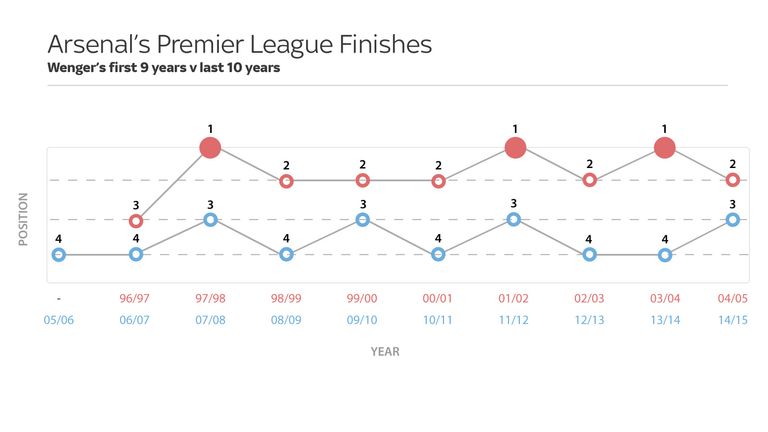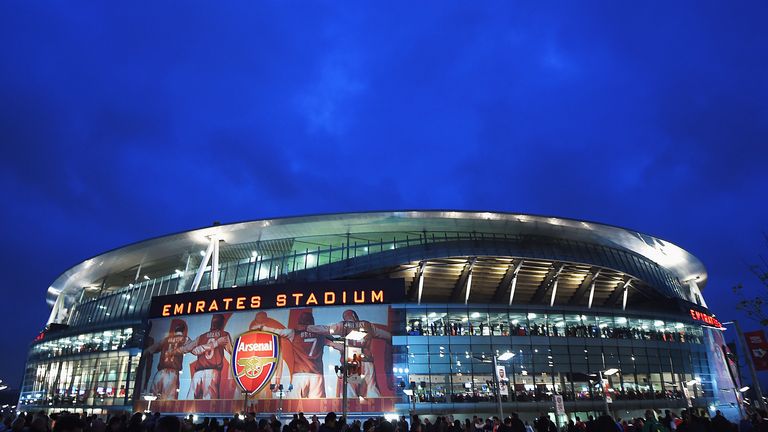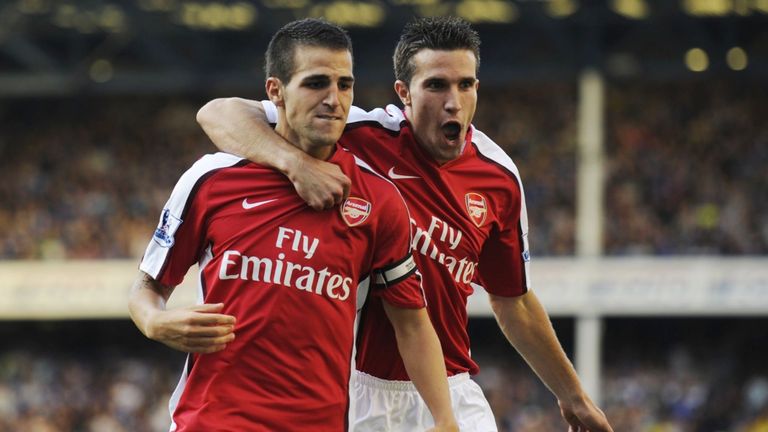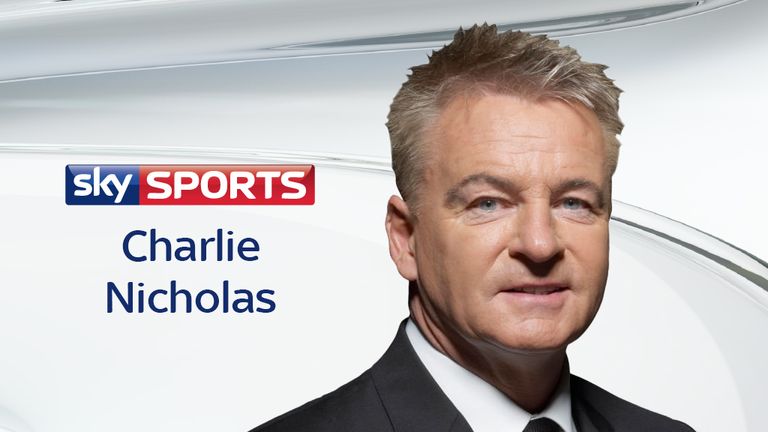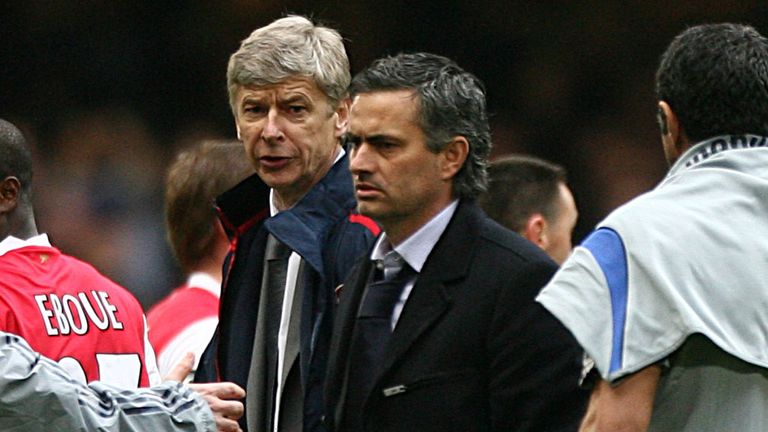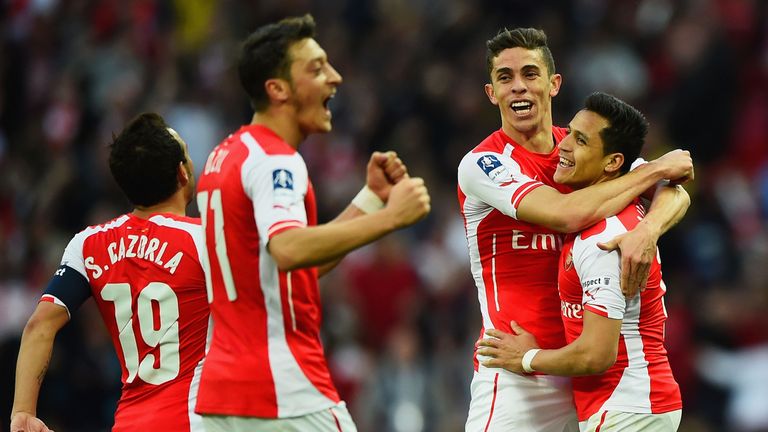Arsenal: Do 10 years of third and fourth place finishes represent failure or success?
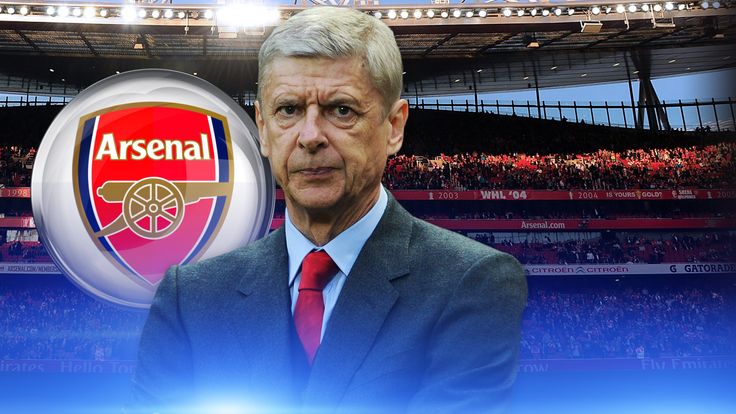
Friday 22 May 2015 11:51, UK
After Arsenal’s goalless draw with Sunderland ended their chances of a highest Premier League finish since 2005, we examine whether a decade of third and fourth place finishes should be deemed a failure or a success for the Gunners…
“I think boring is 10 years without a title. That's very boring. You support the club and you're waiting, waiting, waiting for so many years without a Premier League title, so that's very boring.”
Some call it remarkable consistency, others call it underachievement, while Jose Mourinho thinks it’s “boring”. The Chelsea manager’s comments after their 0-0 draw at the Emirates Stadium last month intensified the debate surrounding Arsenal’s Premier League record over the last 10 seasons, and it remains a polarising subject.
Since finishing second to Chelsea in the 2004/05 campaign, the Gunners have finished every season in third or fourth place. After winning three Premier League titles and four FA Cups in Wenger’s first nine seasons in north London, Arsenal embarked on a well-documented trophyless run.
Last season’s FA Cup triumph brought silverware back to the club after a nine year wait, but the criticism has remained the same after another short-lived title challenge this season. Arsenal are a soft touch, say their critics, they are psychologically weak, predictable and tactically naïve.
Trending
- World Darts Championship: Clemens, Lukeman in action on day five LIVE!
- Transfer Centre LIVE! 'Saudi could offer Rashford way out of Man Utd'
- The Friedkin Group complete Everton takeover
- Five years of Arteta: Arsenal transformed but what's next?
- World Darts Championship schedule: Smith in action on Thursday
- Usyk vs Fury 2: Start time, ring walks, undercard and odds
- Lawson confirmed as Verstappen's Red Bull team-mate for 2025
- Celtic consider move to re-sign Arsenal left-back Tierney
- Tottenham vs Man Utd: We'll see - Amorim on Rashford featuring vs Spurs
- Papers: Gravenberch set to stay at Liverpool amid Real Madrid links
Sky Sports pundit Charlie Nicholas understands the criticism. “You can’t say the last 10 years have been a success,” said the former Arsenal striker. “Arsene has brought us a lot of success, but some of the fans are particularly unhappy with what has been achieved, particularly in the last five seasons.”
The Gunners’ old weaknesses have been exposed in recent weeks. Against well-organised defensive opposition, they have failed to find the net in three consecutive home games. Chelsea and Sunderland have succeeded in frustrating Wenger’s men in goalless draws, while Swansea went one better and pocketed three points with a late Bafetimbi Gomis winner.
Indeed, another third place finish coupled with a familiar last 16 exit from the Champions League brings a sense of groundhog day for the club, but understanding the second half of Wenger’s Arsenal tenure requires a look back.
Stadium move
Arsenal pumped £390million into the construction of the magnificent Emirates Stadium, creating debts which prompted an era of austerity. In recent years Wenger has spoken candidly of the financial implications of the move.
"I had a huge sense of responsibility when we built the stadium to get the club through it without going bankrupt,” Wenger told Arsenal’s official website in 2013. "The first years were difficult, and also explained why we lost some players.”
Patrick Vieira became the first high profile departure when he left for Juventus for £13.75million in 2005, and over the next eight years he was followed by the likes of Thierry Henry, Ashley Cole, Emmanuel Adebayor, Samir Nasri, Cesc Fabregas and Robin van Persie. The Gunners simply couldn’t resist the transfer fees on offer, nor could they afford replacements of the same stature.
Instead, Wenger put his faith in nurturing young players and identifying cheaper alternatives, a precarious policy which yielded varied results. Indeed, Wenger’s unwavering faith in his players is as much a weakness as it is a strength. For every Francis Coquelin, there is a Denilson. For every Van Persie, there is a Nicklas Bendtner.
And Nicholas believes they still lack that winning mentality of old. “You need to build a mentality of winning which isn’t really there, with only a smattering of winners medals throughout the team,” he told Sky Sports. “He brought in Mesut Ozil and Alexis Sanchez who had won titles at Real Madrid and Barcelona but you wouldn’t describe them as leaders with trophy-laden careers.”
Every trophyless year provided more ammunition for his critics, and Wenger’s devotion to attacking football – even against top opposition – frequently proved to be his undoing.
But he always retained the backing of the club. “When you look at what Arsene has done, within the overall constraints, he has outperformed our spending every single year he has been manager. It is extraordinary,” chief executive Ivan Gazidis told the Daily Telegraph in October 2012.
Mourinho notoriously described Wenger as a “specialist in failure” earlier this season, but trophies are not the only measure of success. The Gunners boss has been derided for valuing a top four finish over the domestic cups, but Liverpool, Manchester United and Tottenham would surely agree with the Frenchman having missed out in recent years. And given Arsenal’s stadium debts, a season without the bountiful rewards of Champions League football would have been all the more damaging.
Fresh competition
But at a time when Arsenal tightened the purse-strings, the arrival of billionaire owners at Chelsea and later Manchester City changed the landscape of English football. After years of Arsenal and Manchester United dominance, Roman Abramovich’s exorbitant spending and Mourinho’s arrival from Porto turned Chelsea into a new powerhouse.
Wenger’s winless run against the Portuguese stretched to 13 games with that goalless draw at the Emirates in April, and City have also jumped above the Gunners following Sheikh Mansour’s takeover in 2008.
Since the move to the Emirates Stadium, Chelsea and City have won a combined total of 11 major trophies to Arsenal’s single FA Cup. That statistic alone points to failure on Arsenal’s part, but the complex circumstances require perspective and Nicholas believes his old side are getting closer. “The last five years have been really, really painful but we’re a lot closer to Chelsea and Manchester City than before,” he said.
No more excuses
Now, however, there are no more excuses. Arsenal are in a stronger financial position than ever. Having smashed their transfer record to sign the £42million Ozil from Real Madrid in 2013, this season they have spent close to £100million on the likes of Sanchez, Danny Welbeck, Calum Chambers, Mathieu Debuchy and Gabriel Paulista.
There is no longer a need to cash in on their prized assets, and such lavish spending demands a reassessment of expectations. Wenger deserves credit for maintaining Arsenal’s presence among Europe’s elite over the last 10 years, but it can only be deemed a true success if it is followed by sustained challenges in the Premier League and Champions League.
Back-to-back FA Cup triumphs would be a good way to start, but Arsenal have underachieved in the league and in Europe over the last two years – and Nicholas agrees. “This season can only be deemed a success if we win the FA Cup, just qualifying for the Champions League is not enough for this club,” he said. “The team should be able to kick on with the momentum of winning something this time.”
A third place finish is an improvement on last year, but their points tally is in fact lower than last year’s 79. There have, however, been encouraging big-game victories over Manchester City, United and Liverpool, and Wenger insists he sees signs of real progress. “Overall we have moved forward and it is a good platform to move forward next season,” he said in a recent interview with beIN Sports.
“The consistency that we have shown over the years is absolutely exceptional and for years, where we had no chance to compete for the championship because we had restricted finances, we remained at the top and we developed many strong players. Now, I believe we are in a position where you can expect always more.”
Arsenal have created a perfect platform for success, and Wenger's challenge is now to meet higher expectations.

